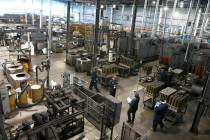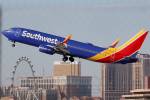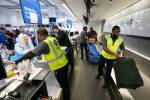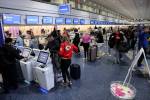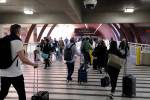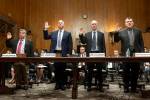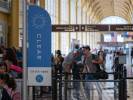Tight budget, cost controls likely to continue at McCarran International Airport
Tight operating budgets continued during the last fiscal year at McCarran International Airport with no end in sight.
According to the annual audit for the 12 months ended June 30, measures such as not filling at least 10 percent of job vacancies, freezing nonunion employee pay, hanging onto computers and software longer and even replacing paper towel rolls in the restrooms less frequently all remained in effect despite a modest uptick in passenger counts. Many measures were instituted about four years ago as the recession, coupled with US Airways' dismantling the hub it operated in Las Vegas, caused an unprecedented plunge in the traffic that generates critical income.
"Right now, we don't see any end to the austerity measures going forward," said Randall Walker, director of the Clark County Department of Aviation, which runs the airport, on Monday. "Some things may not change even if we see brighter light at the end of the tunnel."
For example, thermostats in the concourses were raised a couple of degrees in the summer and lowered in the winter to cut cooling and heating costs. Since passengers did not complain, Walker said, there is no reason to change.
The current budget is based on passenger totals rising 2 percent, what Walker said initially looked conservative based on higher growth rates the previous two years. However, the counts have started declining and the airline schedules for the coming months show no relief.
So the airport staff will work to shave a couple of million dollars out of an operating budget that ran $222.3 million last year.
"We are trying to do this in a real-time basis so that we don't put ourselves in a position where we have to make deeper cuts later," Walker said.
Last year's revenues of $344.1 million marked a 9.5 percent decline from 2010, all of it because of an accounting adjustment of charges assessed on the airlines. As traffic counts fell during the recession, the amount the airlines paid per passenger rose sharply, so McCarran management instituted what amounted to a sticker-shock fund. This rolled some of the charges into a receivable that reached nearly $51 million, to smooth the increase over several years rather than impose it all at once.
The decrease in revenues from the airlines was required by accounting rules to essentially close out the receivable.
Other categories, including concession rentals, fees from the rental car center and parking all rose at low- to mid-single digit percentage rates. The income generated by the slot machines owned by resort owner Michael Gaughan dropped 0.7 percent.
Operating expenses increased
2.3 percent to $222.3 million. The largest category, salaries and benefits, remained flat at $111.2 million. Total payroll increased to 1,495 full-time people from 1,321 with the opening of Terminal 3 in June.
Operations posted a $4 million loss after a $39 million gain in 2010.
In May, Moody's Investor Service lowered the ratings by one step on two sets of debt totaling $3.1 billion, although the bonds remain at investment-grade levels. One other set of bonds, totaling
$1 billion, were kept stable by both Moody's and Standard & Poor's.
The Moody's report attributed the downgrades to the rising charges airlines pay for each passenger, called cost per enplanement, and the tighter gap between revenues and money needed to cover debt payments. Although well within the requirements of the bond terms, debt has risen to finance construction of the $2.4 billion Terminal 3.
Moody's repeated concerns that McCarran's reliance on leisure passengers creates more concerns than an airport with a larger share of business traffic would.
Moody's had McCarran on a downgrade watch for more than two years before acting.
"The bizarre part was when they put us on a negative watch initially, it didn't happen," Walker said. "Then, when the situation starts looking better, they downgraded us."
Contact reporter Tim O'Reiley at
toreiley@reviewjournal.com or 702-387-5290.

















